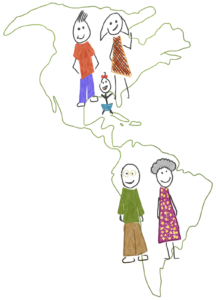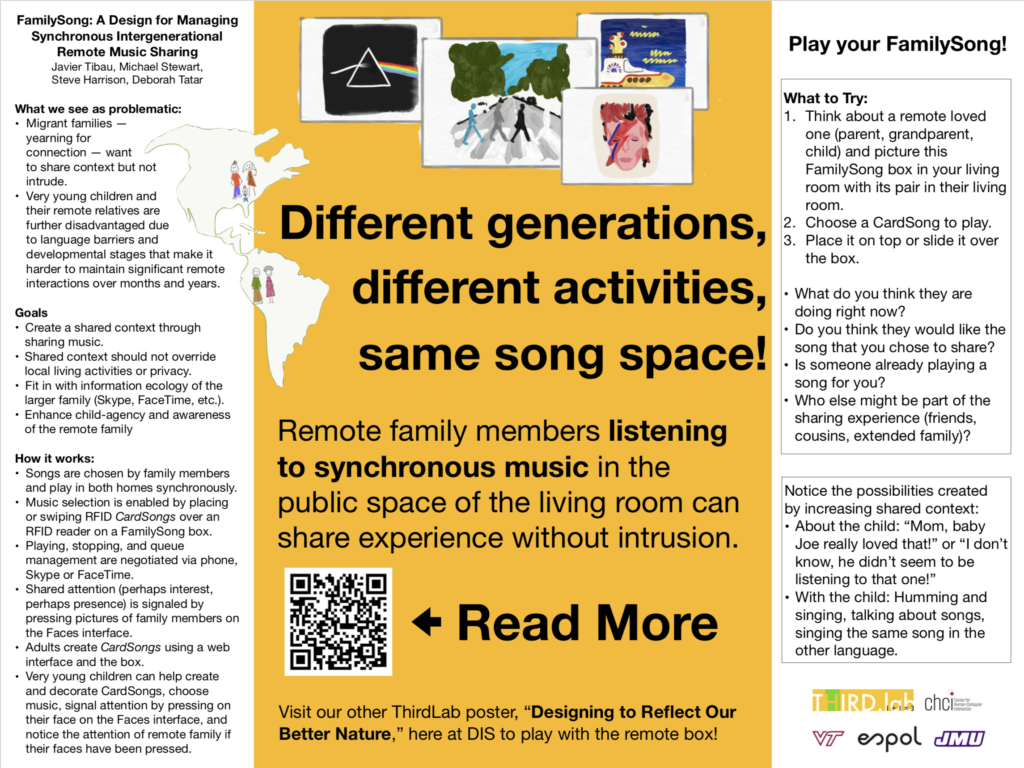FamilySong (FS) connects geographically-separated family members. The demo will show how the design helps different family members, including young children, participate in a synchronized shared-music experience that affords both a feeling of connection and pragmatic opportunities to enhance connection. FS fits into people’s lives by offering the possibility of either background or focused listening. The social properties of music mean that users can experience it as a contemporaneously shared experience and/or as a referential object in future conversations.

Families in our study have migrated to the United States to study. Parents try to find ways to facilitate communication with far-away loved-ones for themselves and their very young children. Grandparents, used to spending a lot of time with their children and grandchildren, yearn for more opportunities for connection. Often, the shortcomings of current technology make interaction through video-chats or phone-calls insufficient or even disappointing.
We frame this research as a domestic Media Space. FS attempts to increase the opportunities for connection between very young children, their parents and their remote grandparents, while respecting their expectations for privacy, intimacy, and daily household time requirements which other studies have also pointed out as crucial to this design space. The current work applies a Research-through-Design methodology in order to understand “what it means to connect like a family.”
We departed from the usage of off-the-shelf cases to create hand-made wooden boxes with a Raspberry Pi computer, built-in speakers, a touchscreen, and a flat top surface that detects RFID tags. Our aim was to create an artifact that could be placed in a prominent location in the living room, such as a coffee table, accessible even to very young children. The design had to be able to stand to regular daily use, including by very young children.
These FS boxes are configured for a representative family. Visitors will be able to assume the roles of family members (very young children, parents and grandparents) using the different interfaces. In particular, they will be able to create CardSongs and use them to play music through the boxes. Since part of the design was to play the music publicly on speakers in households, the music will be audible to all visitors. We will also simulate remote connectivity by having the boxes physically distant in the show space.
The main method for interaction with FS available to all participants is the CardSong interface. However, the touchscreen interface and the card creation web interface provide significant moments in the FS experience that bear special attention.
The top of the box affords the placement of RFID (credit-card sized) cards, or CardSongs. Each CardSong can be assigned a song from the Spotify catalog through a simple web interface. Families are given white sticker labels and color markers to identify and decorate each (reusable) CardSong. The ability to decorate each CardSong provides a medium for interpretation and expression for all ages.
Publications
Javier Tibau, Michael Stewart, Steve Harrison, and Deborah Tatar. 2019. FamilySong: Designing to Enable Music for Connection and Culture in Internationally Distributed Families. In Proceedings of the 2019 on Designing Interactive Systems Conference (DIS ’19). ACM, New York, NY, USA, 785-798. DOI: https://doi.org/10.1145/3322276.3322279
Javier Tibau, Michael Stewart, Steve Harrison, and Deborah Tatar. 2019. FamilySong: A Design for Managing Synchronous Intergenerational Remote Music Sharing. In Companion Publication of the 2019 on Designing Interactive Systems Conference 2019 Companion (DIS ’19 Companion). ACM, New York, NY, USA, 61-64. DOI: https://doi.org/10.1145/3301019.3325159

